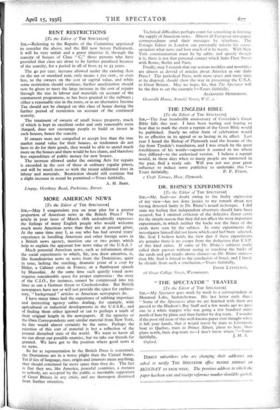MORE AMERICAN NEWS [To the Editor of THE SPECTATOR] SIR, —May
I congratulate you on your plea for a greater proportion of American news in the British Press ? The article in your issue of March 18th undoubtedly expresses the feelings of many English people who would welcome much more American news than they are at present given. At the same time may I, as one who has had several years' experience in handling American and other foreign news in a British news agency, mention one or two points which help to explain the apparent low news value of the U.S.A. ?
Much potential American news, such as information about the social experiments to which, Sir, you drew attention, is, like Scandinavian news or news from the Dominions, quiet in tone, lacking the startling, dramatic point of a coup by Hitler, a Cabinet crisis in France, or a flamboyant speech by Mussolini. At the same time such quietly toned news requires considerable space for proper expression : the story of the C.I.O., for instance, cannot be compressed into ten lines as can a German threat to Czechoslovakia. But British newspapers have not or will not provide the space for explana- tory, " background " articles as American newspapers do.
I have many times had the experience of subbing important and interesting agency cables dealing, for example, with agricultural or industrial developments in the U.S.S.R., and of finding them either ignored or cut to perhaps a tenth of their original length in the newspapers. If the agencies or the Own Correspondents sent similar material from New York, its fate would almost certainly be the same. Perhaps the rejection of this sort of material is but a reflection of the present disturbed state of the world. We want to know all we can about our possible enemies, but we take our friends for granted. We have got to the position where good news is no news.
So far as representation in the British Press is concerned, the Dominions are in a worse plight than the United States. Yet if ties of language, race, origin and interests mean anything, they should command far more space than they do. The fact is that they are, like America, peaceful countries, a menace to nobody, are accepted by the public as inevitable supporters of Great Britain in any crisis, and are thereupon dismissed from further attention.
Technical difficulties perhaps count for something in limiting the supply of American news. Almost all European newspaper correspondents send their messages by telephone. The Foreign Editor in London can personally inform his corre- spondent what news and how much of it he wants. With New York communication must be by cable, and speedy though it is, there is not that personal contact which links Fleet Street with Rome, Berlin and Paris.
Finally, may I remark that our serious weeklies and monthlies are almost as devoid of articles about America as our daily Press ? The periodical Press, with more space and more time at its disposal, should show the way in presenting the U.S.A. to Great Britain. May we hope, Sir, that The Spectator will be the first to set the example ?—Yours faithfully,






































 Previous page
Previous page